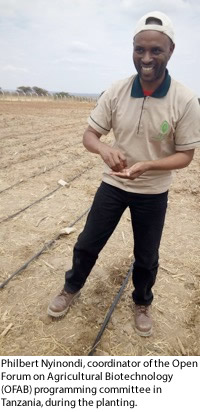
Tanzania Plants First GM Maize Field Trial
October 12, 2016| |
 The first genetically modified (GM) maize research trials have been planted on October 5, 2016 in Tanzania's Dodoma region, a semi-arid area in the central part of the country. The confined field trial aims to demonstrate the effectiveness and safety of a drought tolerant GM maize hybrid developed by the Water Efficient Maize for Africa (WEMA) project. Dr. Alois Kullaya, country coordinator for the WEMA project in Tanzania, said that researchers are happy that they are now able to carry out confined field trials, "and produce tangible results for people to see, as well as illustrate how biotech maize will benefit the farmers." He however stated that the GM maize would take at least three years to establish its value.
The first genetically modified (GM) maize research trials have been planted on October 5, 2016 in Tanzania's Dodoma region, a semi-arid area in the central part of the country. The confined field trial aims to demonstrate the effectiveness and safety of a drought tolerant GM maize hybrid developed by the Water Efficient Maize for Africa (WEMA) project. Dr. Alois Kullaya, country coordinator for the WEMA project in Tanzania, said that researchers are happy that they are now able to carry out confined field trials, "and produce tangible results for people to see, as well as illustrate how biotech maize will benefit the farmers." He however stated that the GM maize would take at least three years to establish its value.
Tanzania's progress comes a year after the country revised a strict liability clause in the Environment Management Biosafety Regulations. The restrictive clause stated that scientists, donors, and partners funding research would be held accountable in the event of any damage that might occur during or after research on GM crops. Such developments in Tanzania, therefore provides hope for the technology's prospects across the continent. This is fundamental because Africa has been ravaged by frequent drought over the years, leading to severe crop shortages and hunger for over 300 million Africans who depend on maize as their main food source.
Under a royalty-free licensing agreement, seed companies in Tanzania, Kenya, South Africa, and Uganda are already growing and selling DroughtTEGO™, a drought tolerant maize hybrid developed by WEMA to suit local conditions.
For more details, read the article at the Cornell Alliance for Science website or contact Dr. Alois Kullaya at akkullaya@yahoo.co.uk.
| |
Biotech Updates is a weekly newsletter of ISAAA, a not-for-profit organization. It is distributed for free to over 22,000 subscribers worldwide to inform them about the key developments in biosciences, especially in biotechnology. Your support will help us in our mission to feed the world with knowledge. You can help by donating as little as $10.
-
See more articles:
-
News from Around the World
- Nobel Prize for Chemistry Awarded to Molecular Machine Makers
- Tanzania Plants First GM Maize Field Trial
- Ethiopian Government Commended for Agri-biotech Initiatives
- First Harvest of Arctic® Golden Apples Completed
- American Soybean Growers Urge US House, Senate to Support Biotech Education Funding
- Chinese Scientists Control Verticillium dahliae Wilt Using Gene Technology
-
Research Highlights
- Expression of Phytase Gene in Wheat Endosperm Increases Availability of Iron and Zinc
- Transcription Factor ERF109 Improves Salt Tolerance in Arabidopsis
- Overexpression of AtOxR Improves Abiotic Stress Tolerance and Vitamin C Content in Arabidopsis
-
Beyond Crop Biotech
- Protective Protein of Water Bears Helps Human DNA Withstand X-ray Damage
- Beer Yeast Genomes Reveal Domestication History
-
From the BICs
- ACSAD and EBIC Hold Biotech Workshop and Form Arab Biotech Network
-
Announcements
- ICABBBE 2017
-
Plant
- TALENs-mediated Targeted DNA Insertion Approach for Potato
- Scientists Review the Use of Engineered Viruses in Genome Editing Tools
-
Read the latest: - Biotech Updates (April 24, 2024)
- Gene Editing Supplement (April 24, 2024)
- Gene Drive Supplement (February 22, 2023)
-
Subscribe to BU: - Share
- Tweet
